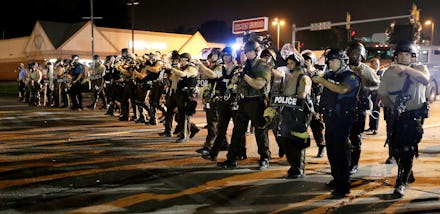Will Washington Actually Do Anything About the Militarization of the Police?

Demilitarizing the police is an issue everyone can agree on — for now.
After protests of the Michael Brown shooting became violent, police in full combat gear turned the streets of Ferguson, Mo., into a warzone. Then it turned political. Politicians who couldn't be further apart on most issues started singing the same tune. Sens. Rand Paul, Ted Cruz and Claire McCaskill all lamented the extreme force and militaristic nature of the police overreaction.
Just don't expect anything to come of it. The political reality in Washington is such that even for an issue on which libertarians and liberals agree, the prospects of legislative movement look dim.
One might think that with such seemingly widespread agreement, something could be done to demilitarize the country's police forces. When top-tier Republican candidates like Rand Paul and Ted Cruz are issuing statements that sound like the ones coming from the dozens of protests springing up around the country, one could be forgiven for thinking a groundswell is beginning to occur. When libertarians and reactionary liberals find common cause in making America look a little less like a Mad Max movie, the possibility of bargaining and compromise and bipartisan legislation may seem to be a little more likely.
But agreement does not necessarily lead to legislation, and the prospects on that front look significantly dimmer.
The most likely political outcome in the wake of Ferguson is that Congress will do what it does best — nothing at all.
In the House, Rep. Hank Johnson (D-Ga.) announced that he would introduce a bill — the "Stop Militarizing Law Enforcement Act" — that would limit the availability of military weapons and equipment to local law enforcement. Sen. Carl Levin (D-Mich.), who chairs the Armed Services Committee, said that his committee plans to reevaluate the program that provides local police forces with such heavy-handed military equipment. Levin "will review this program to determine if equipment provided by the Defense Department is being used as intended" before bringing the next defense bill to the Senate floor.
Either bill would present a tough choice to members of both parties in both chambers. Democrats in swing districts would have to decide between risking being seen as soft on crime on the one hand and offending liberal supporters in a year when base support is key on the other. Establishment Republicans cozy with defense contractors would be up against the libertarian block that prefers less government spending and more emphasis on civil liberties. This issue could be the canary in the coal mine in terms of base libertarian support heading into 2016.
On the executive front, President Obama said Wednesday that "I think it's probably useful for us to review how the funding has gone, how local law enforcement has used grant dollars, to make sure that what they are purchasing is stuff they actually need. Because there's a big difference between our military and local law enforcement and we don't want those lines blurred."
But even Obama's tepid support might have the opposite of its intended effect. As Ezra Klein notes, given the president's waning popularity and the tendency of anything he touches to elicit immediate opposition, his support could mean any legislation is doomed to fail.
And really, how many Republicans are going to vote for a bill backed by the ACLU? No one will have the appetite to vote on this issue two months before an election. If Congress punts until after the midterms, the moment will have passed and public interest in the issue will fade away.
It's not inconceivable that someone like Rand Paul could, during the next round of NDAA negotiations, insert language stripping out Section 1033, the part of the law that allows for police forces around the country to purchase military weapons and equipment at a discount. He could do that. But then he would undoubtedly face criticism in the 2016 Republican primaries about how he kept cops from getting the equipment they need to protect the public. Defanging the over-weaponized police may sound good to independents and a general election audience, but it will get an ugly reception in places like South Carolina, where passion for the military and tough-on-crime conservatism runs deep.
If a bill expanding background checks for purchasing firearms couldn't get through the Senate after Newtown, don't expect the entire country to begin demilitarizing their police forces because of a divisive racial skirmish in August when half of the country is on vacation. The most likely political outcome in the wake of Ferguson is that Congress will do what it does best — nothing at all.